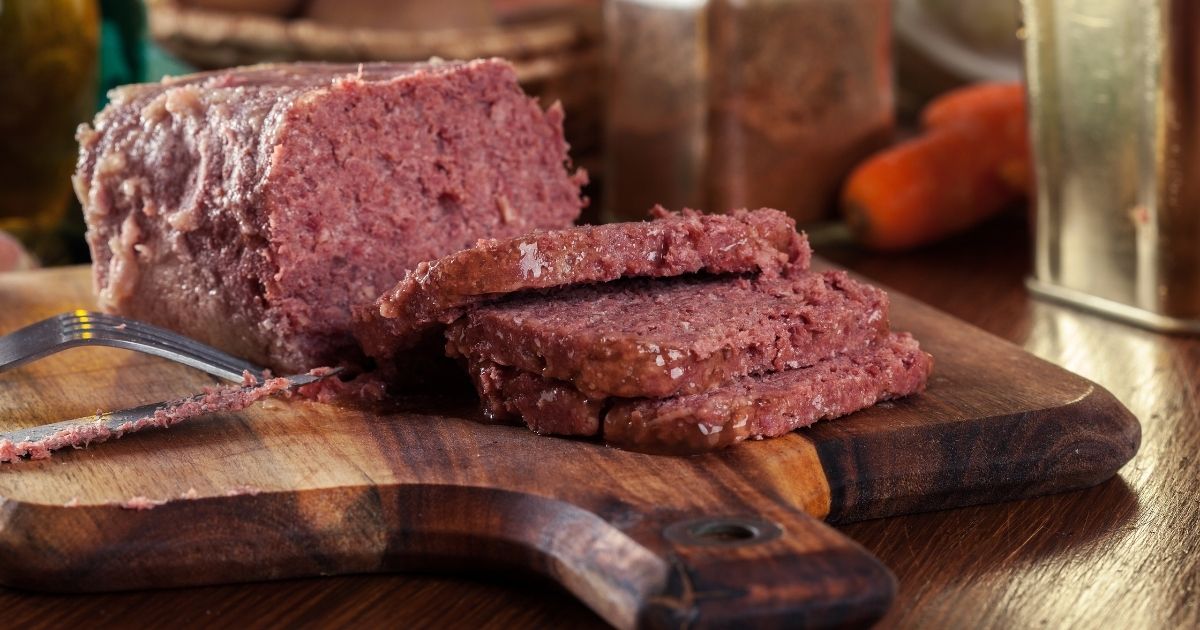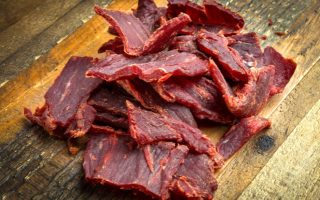There are many things we humans eat that we may want to share with our dogs, maybe not as a main meal, but as a pampering treat.
Who wouldn’t want to show some love to a pet? Plus, a little extra meal wouldn’t hurt, would it?
When it is corned beef, don’t be so sure. Dogs can cope with some meals humans eat, but others may be dangerous to them.
Salt, garlic, and chocolates are some examples of toxic foods. According to AKC, some people-food can ‘wreak havoc on a dog’s body’ while others ‘provide health benefits.’
To be fair, dogs love beef, and this is not an exception.
But can dogs eat corned beef? Is corned beef toxic to dogs?
On Saint Patrick’s Day, you may be feeling generous and want to celebrate with your canine and feed your dog corned beef.
While we do applaud that animal kindness, it may end up being more harmful than good.
Here’s more information on this tricky topic.
What is corned beef?
We make corned beef out of beef brisket. However, they are not considered the same.
Corned beef becomes so when it has been cured in salt brine. The salting keeps the beef from getting spoilt until it is refrigerated.
It takes about 5 days for corned beef to be cured. Ingredients include herbs, garlic, and spices.
The beef brisket is often used because of its tough nature. The salting process renders the beef soft. It gets sliced after that and put into sandwiches.
Corned beef is also known as salt beef in some other countries outside the United States. History has it that the term originated in the 17th century. Credits go to the English.
Corned beef became a traditional St Patrick’s meal in the United States, notably by the Irish.
Can I feed my dog corned beef?
Notwithstanding dogs’ strong appetite for meat, corned beef is not the best type of meat to give a dog.
It may seem harmless, but there are some reasons to think otherwise.
1. Don’t overlook the salt
As earlier noted, corned beef gets bathed in salt. Thus, it has a high level of sodium. There is over 800 mg of sodium in corned beef.
While salt is beneficial to humans, it can be detrimental to dogs. A little salt may not do much, but when it surpasses 1.5 grams, it becomes a problem.
You do the math with corned beef.
2. There’s that garlic to consider
Vegetables like onions, garlic, and scallion should not be fed to a dog as they can be considered toxic.
You should be cautious in this regard because garlic and the allium genus family lead to hemolytic anemia.
In simple English, the red blood cells of an infected dog get invaded and destroyed. This condition is fatal.
3. Corned Beef is a fatty
Nothing puts a dog at risk more than obesity, no matter how cute a fat dog might look.
Not only does it make the dog inactive, but it also leads to medical conditions ranging from mild to severe. Diabetes and heart disease are some serious conditions.
Besides that, fatty foods may not sit well in a dog’s stomach. Stomach complications may develop, resulting in vomiting and diarrhea.
It can also lead to pancreatitis—the swelling of the pancreas.
4. Corned Beef also has sugar
While sugar isn’t poisonous to dogs, an excess amount can make a dog obese. It can also cause diabetes, just like humans.
5. Corned Beef is toxic for ailing dogs
If other dogs can escape the risks of consuming corned beef, sick dogs may not be able to. Dogs with bad kidneys and weak hearts should avoid corned beef.
Is Corned Beef Toxic to Dogs?
While your dog may not drop dead after eating corned beef, understand that the salt in corned beef is toxic for dogs.
If your dog eats a large quantity of corned beef, he will display worrisome symptoms like vomiting, diarrhea, a strong need for water, and even abnormal movements.
If left unchecked, the high level of salt could be fatal.
The garlic in corned beef isn’t high, so it may not harm the dog except the latter eats a big amount of corned beef.
If you must feed your dog corned beef, mix it up with another food. It must also be in small quantity. Do not include corned beef as the main diet.
The corned beef itself has some good nutrients, but the sodium level makes it perilous.
To further understand this, here is the nutritional value of corned beef, using 85 grams as a case study.
- Calories: 213 cal
- Fat: 16g
- Protein: 15g
- Carbohydrates: 0g
- Sodium: 827mg
- Cholesterol: 83mg
- Iron: 1.86mg
- Vitamin B12: 1.6mcg
- Selenium: 27.9mcg
How much corned beef can dogs eat?
Again, your dog should abstain from eating corned beef. Other meat products are beneficial to canines without any side effects.
Bacon and chicken are good and common instances. A dog won’t die if he’s deprived of corned beef (he may be hurt, but that can’t be helped) but you could put him in harm’s way if you indulge his longings.
Having said that, a little corned beef may not be a problem. Consider the brand that produced the corned beef and the ingredients used before making a decision.
Some brands add a lot of salt and other seasonings to their meat for better taste. It makes it delicious for humans, but a poor choice for dogs.
Dogs can cope with corned beef that has a low amount of salt. Even then, it should be given as a sparse treat (maybe in the spirit of St Patrick) but not as the main diet.
What to do if my dog ate corned beef (a lot)
So, if your dog accidentally consumes a lot of corned beef, get some water handy for the dehydration caused by salt and watch out for any symptoms.
If you detect a slight uneasiness, get your dog to the vet.
Advantages and disadvantages of corned beef
While corned beef is not recommended for dogs, it doesn’t make it a devil in meat cloak. After all, corned beef is a form of beef, and beef has numerous benefits to dogs.
Some of the advantages are:
- It boosts the immune system
- The niacin in corned beef is good for the heart
However, the disadvantages surpass any perceived benefits. We’ve dealt with the cons of corned beef, but here are some of the highlights for emphasis:
- It has a high concentration of salt
- It contains garlic
- It is fatty
Altogether, corned beef may land a dog in a hospital bed.
Can dogs eat corned beef hash?
Corned beef hash has a high level of sodium, making it risky for dogs. It also has fat, and too much fat makes a dog gain weight. Fat equally leads to medical complications.
In addition, corned beef hash has garlic and onions, which we’ve seen is bad for dogs. The flavors and other additives in the corned beef hash are unsuitable as well.
Can dogs eat fresh corned beef?
Corned beef in its different forms is not convenient to dogs, especially in large proportions.
Sodium and other harmful ingredients are present in fresh corned beef. Thus, it shouldn’t be a part of a dog’s main diet.
Can dogs have cooked corned beef?
Cooked corned beef has the same amount of sodium (due to being brined), which makes it harmful for a dog. Like fresh corned beef, cooked corned beef should best be reserved for humans, not a dog.
Cooked beef in general offers benefits for a dog, but the saltiness is what makes corned beef stay in the red zone.
Can dogs eat corned beef brisket?
Corned beef brisket is a bad idea for a dog food. There are two main reasons for this.
Briskets contain a lot of fat that puts your dog at risk of being obese. It also has sodium. So, corned beef brisket is not advisable for canines.
Can dogs have corned beef and cabbage?
Cabbage is not toxic for dogs and is suitable for them. It should not be overeaten, and it should be cooked without seasonings.
Raw cabbage isn’t advisable because of onions and a property named thiocyanate.
Corned beef is not convenient for dogs, even when mixed with cabbages. It is best to abstain from feeding a dog this.
Can I feed my dog cooked beef?
Beef is a good source of protein, an essential ingredient for any dog. The fatty acids in beef also help a dog in muscle development.
It is good and healthy to feed your dog cooked meat, but in a moderate amount to avoid obesity.
Why is corned beef unhealthy?
Corned beef has some healthy nutrients like protein and fatty acids, similar to other forms of beef. However, it is high in fat and sodium, which is unhealthy for dogs.
Can dogs eat canned corned beef?
Both for humans and dogs, canned corned beef may not be the best option for a meal. It is high in cholesterol, fat, and sodium.
Wrap Up
Beef is a good and healthy addition to a dog’s diet, but not when it is corned.
While it can be given in small amounts, it is best to avoid feeding a dog corned beef.
Find better alternatives to corned beef that would give your dog the much-needed animal protein, without the setbacks.
Chicken, lean ground beef, roast, and turkey are good meat for dogs.
Related:







